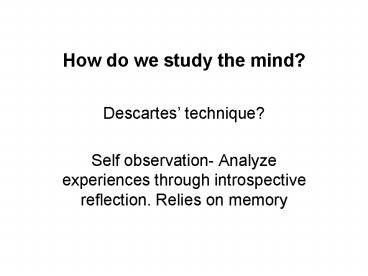How do we study the mind - PowerPoint PPT Presentation
1 / 29
Title:
How do we study the mind
Description:
Embraced Cartesian assumption that mind is transparent to itself ... the cognitive side, a cramp of apperception towards a small group of ideas ... – PowerPoint PPT presentation
Number of Views:24
Avg rating:3.0/5.0
Title: How do we study the mind
1
How do we study the mind?
- Descartes technique?
- Self observation- Analyze experiences through
introspective reflection. Relies on memory
2
Titchener Structural Psychology
- Goal Analysis of mind into elementary units
- Embraced Cartesian assumption that mind is
transparent to itself
3
Attempted to make introspection more scientific
- Internal perception- respond immediately to
carefully controlled stimuli. Detailed reports of
conscious events occurring while completing task - Describe nature and number of basic mental
processes. Identified 3 sensations, images and
affections
4
INTROSPECTIONISM
- Heart of experimental psychology because
conscious experience is primary concern - Assumption about mental processes
- Images underlying element of all ideas
- Imageless thought did not exist
5
Problem with method of introspection?
- Name instance of category
- (what are effects of stimuli? How does it affect
you? What does it bring to mind?)
6
- Weather?
7
- Money?
8
- Vegetable?
9
- Crime?
10
- Swear word?
11
Methodological problem?
- Impossible to have conscious experience and
reflect on it at the same time
12
Titcheners solution
- Delay observation and describe from memory
- Break into stages, e.g., perceive word, search
for response, find response, produce response - Acquire introspective habit (can observe and not
interfere)
13
- Taught not to describe stimuli but conscious
experience resulting from stimuli
14
Resulted in long, boring and repetitive accounts
- observed enough this summer to find that I
cannot find anything in it but organic and other
sensation unpleasantly colored and, on the
cognitive side, a cramp of apperception towards a
small group of ideas related to the thing dreaded
with certain resultants in instinctive act and
thoughtWhen the storm became imminentthere would
be cardiac and visceral symptoms to describe etc.
15
From someone studying the psychology of pain
first hand
- I let a horse throw me from his back, allowing me
to drop on my shoulder and head. I showed a
beautiful case of loss of consciousness before
the actI not only do not remember mounting and
the horse running, but I forgot almost everything
that happened,,,from the time I got up in the
morning till I regained complete consciousnessI
can form no continuous series of events. My head
was bad for a while but is all right now, but my
arm has served the purpose of quite a number of
experiments as it still continues quite
painfulThe psychological side of my afflictions
will form the basis of at least three lectures
next fall.
16
Introspectionism failed as methodology
- Unreliable non-replication of results, training
produced bias, e.g., imageless thought
controversy. - No independent way of testing.
17
- Watson Opposed view that conscious experience is
concern of psychology. - Take the case of sensation. A sensation is
defined in terms of its attributes. One
psychologist will state with readiness that the
attributes of a visual sensation are quality,
extension, duration and intensity. Another will
add clearness. Still another that of order. I
doubt if any one psychologist can draw up a set
of statements describing what he means by
sensation which will be agreed to by three other
psychologists of different training.
18
Theoretical framework for introspectionism and
structuralism failed Mind is NOT transparent to
itself
- Introspection is irrelevant to many interesting
processes, e.g., skills, athletic and in
language.. - We are aware of outcome of mental operations, not
operations themselves, e.g., exemplars, mental
arithmetic
19
Watson proposed for methodology
- Scientific technique requires that data are open
to inspection Behavior is public, consciousness
is private. - Scientific laws cannot be formulated by studying
the mind - Observable and measurable behavior is object of
study - Theoretical goal prediction and control of
behavior
20
Theoretical position
- Specific contribution of organism is
insignificant (e.g., mental structures,
instinct). - External factors (stimulation and reinforcement
history) are significant determinants of behavior - Processes are reflexes (physiological) and not
concern of psychology
21
Watson
- Importance of animal work
- no dividing line between man and brute
22
Classical or Pavlovian conditioning
- CS (light)
- CR
- US (food) UR (salivation)
23
Operant or instrumental conditioning
- Stimulus Response reinforcement
- Increased probability of response given stimulus
24
Conditioning of emotional response
- Little Albert
25
Weakness of Behaviorism
- Confused method (introspection) with model of
mind (mental events). Eliminated both instead of
just former.
26
- Methodology supported by logical positivism
knowledge of natural phenomena results from
observation of measurable events. - Unobservable concepts unavoidable positivists
distinguish between observable and theoretical
events, e.g., gravity - Operationism- scientific concepts defined with
reference to operations used to measure them - Operational definitions defined non-observable
concepts
27
- Skinner rejected non-observable concepts
- explanatory fictions
- e.g., word association- what causes response?
28
- What is felt or introspectively observed is not
some nonphysical world of consciousness, mind or
mental life, but the observers own body
29
Contributions of Behaviorism?































